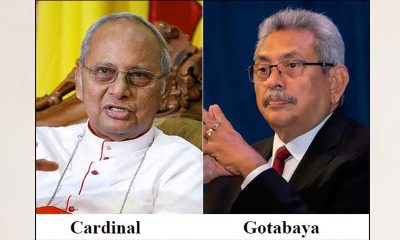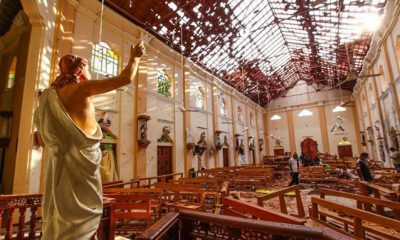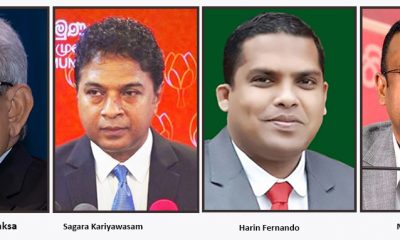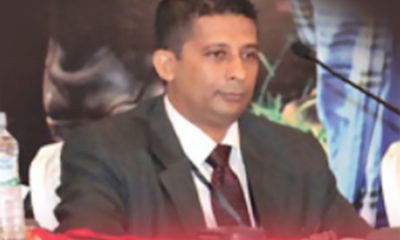Editorial
Channel 4 – Why now? Why not?

The latest Channel 4 documentary on Sri Lanka’s Easter Sunday bombings is claimed to be an exposure, but while there’s nothing dramatically new in it, it seems to have is set the cat among certain pigeons. Allegations that the military intelligence was involved with Islamic extremists involved in the Easter Sunday carnage is not new. In fact, three investigations have already linked the Directorate of Military Intelligence (DMI) and the State Intelligence Service (SIS) to the bombers.
What the new allegations in the Channel 4 documentary against the current SIS chief and former DMI officer, retired Major General Suresh Sallay, are aimed at is connecting the dots to the Rajapaksa family, and Gotabaya Rajapaksa, in particular. The video suggests there was a conspiracy to bring the Rajapaksas back to power in 2019. The bombing certainly helped Gotabaya to clinch the presidential candidacy at a time when the country clamoured for a strong leader who could fight terrorism. Within two days of the April 21, 2019 bombing, Gotabaya came out declaring that he was the national security candidate who could wipe out Islamic extremists.
It should be clear even to those not familiar with local political chicanery that Gotabaya Rajapaksa benefited from the attack, but there is no proving beyond reasonable doubt that he organized the carnage. So what is the new Channel 4 video about? On the face of it, it is an attempt by the British public broadcaster (Channel 4 is a British government-owned network) to find the “truth” behind the Easter attacks, a campaign spearheaded by Cardinal Malcolm Ranjith and the Catholic Church. The Vatican too had weighed in with the Pope himself urging Sri Lankan leaders to establish who was behind the most audacious terror attack even for a country used to decades of senseless violence.
The SLPP has been quick to dismiss the documentary arguing that their party was on the ascendancy after the February 2018 local elections when they won a landslide and was anyway on the road to building on that success at the November 2019 presidential polls.
The SLPP stalwarts may have forgotten how unpopular they had become with their 52-day “coup” with the backing of President Maithripala Sirisena. The then Prime Minister Ranil Wickremesinghe saw a surge in the support for him during the illegal power grab orchestrated by Sirisena and Mahinda Rajapaksa.
Insiders know that Gotabaya Rajapaksa was taken by surprise when he heard from a friend that elder brother Mahinda had been sworn in as prime minister. His prospects dimmed when public opinion turned against the SLPP with the power grab. Then comes the Easter bombings. There is no denying that Rajapaksa won, thanks to the public anger over the failure of the Wickremesinghe-Sirisena government to prevent the carnage. People were angry that intelligence warnings issued by an agency in neighbouring India had been ignored. Sri Lanka’s own DMI and SIS were oblivious to what was going to happen.
A vocal campaigner who had previously pointed fingers at the state intelligence apparatus, Manusha Nanayakkara, agrees that the allegations should be investigated afresh, but casts aspersions on Channel 4 intentions. He and other worthies of the SLPP have said that the video was timed for the UN Human Rights Council sessions opening tomorrow (Sept 11) in Geneva.
The British broadcaster had initially announced their documentary was going to be aired on August 15. Then it was pushed back by another week. Finally, it was released on Tuesday British time (Wednesday early morning Sri Lanka time) after Sri Lankan authorities raised issues that had to be legally resolved. The UNHRC has three regular sessions a year — February-March, June-July and September-October. Therefore, to argue that this release is to coincide with a UNHRC session is a stretch.
Gotabaya Rajapaksa has responded to the documentary and denied that he influenced Suresh Sallay or had any dealings with the intelligence operative while he was out of power between 2015 and 2019 and had nothing to do with the intelligence and security apparatus. Looks like Gotabaya has also forgotten about the 52-day government his brother led and that he still had loyalists in the security establishment. In fact, Gotabaya admits in his statement that he promoted Sallay as the head of the SIS, no sooner he became president.
More strangely, Gotabaya remains silent on an equally devastating allegation that he wanted the editor of the Sunday Leader Lasantha Wickrematunge killed. The “insider” quoted in the Channel 4 video, whistleblower Azad Maulana, claims Gotabaya wanted Lasantha killed ASAP (As Soon As Possible). Maulana was the spokesman of the then Eastern province chief minister and current SLPP MP, Sivanesathurai Chandrakanthan, alias Pillayan. There are allegations that Pillayan was involved with the formation of the infamous “Tripoli” unit of the DMI which is accused of killing Lasantha and attacking several others when Gotabaya was the defence secretary under his brother Mahinda’s presidency.
Thus, the Channel 4 video does not offer any answers, but only raises more questions. As with the three previous investigations, the sum total of the documentary is the need for not only criminal investigation but a broader intelligence probe. MPs from both sides of the House have called for the suspension of SIS chief Suresh Sallay, who is implicated in the documentary. He has denied meeting the Easter Sunday bombers and argued that he was out of the country at the time. However, one of his former bosses, Field Marshal Sarath Fonseka has already cast doubt over those claims saying Sallay, like many other intelligence operatives, would have travelled under several passports.
As Cardinal Ranjith himself articulated on Wednesday, whatever the perceived bias is of Channel 4, it is time for an independent, transparent, internationally acceptable investigation into all aspects of the carnage. The government owes it to its people, not least the victims and survivors of the attacks, because it is the right thing to do.
Editorial
Anger wells up as people queue up

A shortage of cooking gas has affected several areas, where there are long lines of people near gas sales points. These scenes evoke one’s dreadful memories of winding queues for essential commodities in 2022. The two situations however do not bear comparison in that the country had no forex for petroleum imports in 2022 whereas there is no such problem at present; the gas shortage is mainly due to supply mismanagement.
The LP gas shortage has gladdened the hearts of the Opposition politicians immensely. They have got hold of something to beat the government with. They are making the most of the issue and urging the government to ensure an uninterrupted gas supply. Having failed to secure enough popular support to win elections, they are apparently deriving some perverse pleasure from the people’s predicament. In 2022, the then Opposition, including the JVP, used public resentment, which stemmed from shortages of essentials and long queues, to fuel their political projects and oust President Gotabaya Rajapaksa. The JVP went on to garner favour with the irate public and capture state power.
The JVP-NPP government is taking great pains to deny the obvious. On Friday, the ruling party frontbenchers went ballistic in Parliament, berating the Opposition for making what they termed a false claim that there was a gas shortage. They are far removed from reality. If they care to look around, they will see long lines of people near gas sales points in some areas. They had better come to terms with reality and sort out the gas shortage, which shows signs of worsening.
The Consumer Affairs Authority (CAA) has sought to make light of the gas shortage. It has been making political statements in defence of the government, instead of taking action to safeguard the interests of consumers. It has urged the public not to stock up on cooking gas. It has also claimed that the state-owned gas company, Litro, has had to meet a shortfall in the gas supply caused by the failure of Laugfs to cater to its consumers. The CAA needs to be told that there is no way the public can hoard cooking gas. They cannot store more LP gas than the cylinders in their possession can hold. It is next to impossible to purchase new cylinders to hoard gas. Litro also does not supply gas to Laugfs consumers using yellow cylinders, and therefore it does not have to release more gas into the market to meet a Laugfs gas supply shortfall.
The government insists that Litro has enough gas stocks. If so, why doesn’t it order Litro to increase the supply and end the gas shortage forthwith? The Opposition has said the gas shortage has come about as the government awarded the contract for supplying LP gas to a new company. One may recall that speaking in Parliament in December 2025, Opposition MP Chamara Sampath Dassanayake warned of a possible gas shortage in February. He said the government in its wisdom had contracted a new gas supplier who was not capable of ensuring a reliable supply. Former Minister Champika Ranawaka has said the government had to change the supplier in keeping with the conditions the US laid down for reducing the so-called Trump tariffs on Sri Lankan exports. The government has chosen to remain silent on these claims. An explanation is called for. If it is true that the new supplier is not equal to the task of ensuring a steady supply of LP gas, the government will have its work cut out to eliminate gas shortages and queues and prevent public anger from welling up.
People’s aversion to shortages of essentials and queues knows no bounds. It was one of the reasons for the crushing defeat the SLFP-led United Front government suffered in 1977. It also became the undoing of Gotabaya Rajapaksa’s presidency in 2022. Aragalaya, which developed into a massive protest campaign, started off as a series of agitations against fuel and milk food shortages, in urban areas. People did not have to take to the streets in 2022; they were already there waiting in winding queues. The situation is obviously not so bad at present, but anything is possible in politics. It is a big mistake for a government to take public resentment for granted.
Editorial
Reinventing the wheel

Saturday 21st February, 2026
The JVP-NPP government has appointed another Parliamentary Select Committee (PSC) to study the electoral system under which the Provincial Council (PC) elections are to be conducted and submit proposals and recommendations to Parliament. It is bound to take a month of Sundays to complete that task. In fact, that is exactly what it is intended to do; the government wants the PC elections delayed further as it is not ready for an electoral contest.
Speaker Dr. Jagath Wickramaratne announced in the House that the PSC had been constituted under the chairmanship of Minister Vijitha Herath. Other members are Muneer Mulaffer, Attorney-at-Law Sunil Watagala, Arun Hemachandra, Ranjith Madduma Bandara, Mano Ganesan, Lakshman Nipuna Arachchi, Shanakiyan Rajaputhiran Rasamanickam, Samanmalee Gunasinghe, Darmapriya Wijesinghe, Chandana Sooriyaarachchi and Nizam Kariapper. The PSC is scheduled to commence deliberations shortly. Rasamanickam has already warned that the government is all out to postpone the PC polls further.
The JVP-NPP government, which came to power promising a new political culture, has demonstrated that it does not scruple to stoop to any level to safeguard its political interests. In the run-up to the 2024 presidential election, the JVP/NPP promised to hold the PC elections expeditiously if voted into power. The NPP election manifesto, A Thriving Nation: A beautiful Life, makes a solemn pledge to hold the PC polls within one year of the formation of an NPP government. “Provincial councils and local government elections, which are currently postponed indefinitely, will be held within a year to provide an opportunity for the people to join the governance” (p. 127). It is said that between saying and doing, many a pair of shoes is worn out.
There is no argument about the need for electoral reforms. The Proportional Representation (PR) system has shortcomings, which need to be rectified. The new Mixed Proportional system, under which the local government (LG) elections are held, is seriously flawed. It has led to a two-fold increase in the number of local councillors. There are now more than 8,000 LG members. This increase may have served the interests of politicians and their parties but certainly not those of the public. Why should the people be made to pay through the nose to maintain more than 8,000 councillors when the LG bodies can manage with only half that number as they did in the past.
If the PC elections are also held under the Mixed Proportional system, the number of provincial councillors will double. Currently, about 450 PC members are elected. There is no gainsaying that the Mixed Proportional system has to be changed before being used at the provincial level. The implementation of the new electoral system requires the delimitation of electoral boundaries. Much has been discussed about the flaws in this system and the remedies to be adopted. There is no need to reinvent the wheel.
What the government should do now is to amend the PC Elections Act and hold the long overdue PC elections under the PR system soon while the PSC proceedings are continuing. Future PC elections can be held under a new electoral system. The Opposition has been clamouring for the PC polls, and therefore an amendment to the PC laws can be ratified unanimously. After the PCs are duly elected, the PSC on electoral reforms can take as long as it needs to reinvent the wheel.
Editorial
PC polls in limbo amidst govt.’s mumbo jumbo

Friday 20th February, 2026
The JVP-NPP government finds itself in an unenviable position over the Provincial Council (PC) polls, which have been in abeyance for nearly a decade. In the late 1980s, the JVP plunged the country into a bloodbath in a bid to prevent the establishment of the PCs, which it said would endanger the territorial integrity of the country. Today, it has a two-thirds majority in Parliament and its leader Anura Kumara Dissanayake is the Executive President. It is therefore well positioned to carry out its promise to do away with the PCs. After all, some election monitors have called upon it either to hold the delayed PC polls or to consider abolishing the PCs. It has chosen to do neither. Its leaders who vowed to liberate this country from India, which created the PC system, are seen pressing the flesh with the Indian leaders.
The Tamil National Alliance (TNA) has accused the JVP-NPP government of trying to use a parliamentary select committee (PSC) to delay the PC polls further. TNA MP Shanakiyan Rasamanickam has reportedly opposed a government plan to bring the PCs within the remit of a new PSC. He has pointed out that a PSC on the PCs already exists, and the duplication of the PSC process will only lead to confusion and create conditions for the PC polls to be further delayed.
MP Rasamanickam’s fear is not unfounded. It is obvious that the government is not ready for an election. Otherwise, it would have amended the PC Elections Act, enabling the Election Commission to hold the PC polls under the Proportional Representation system soon. All signs are that it will do everything in its power to avoid an electoral contest this year. Its fear of elections has given the lie to its claim that its approval rating has improved.
The TNA is not alone in urging the government to hold long-delayed PC elections. The SJB, the SLPP, the SLFP and the UNP are also demanding that the PC polls be held immediately. All these political parties facilitated the passage of an extremely bad Bill to amend the PC Elections Act in 2017, thereby helping the UNP-led Yahapalana government postpone the PC polls . They ought to tender an apology for that blatantly undemocratic act.
It may be recalled that the TNA, the SLFP, the JVP and the Joint Opposition, consisting of the SLFP dissidents who subsequently formed the SLPP were prominent among the parties that enabled the ratification of the aforesaid shockingly awful Christmas tree Bill loaded with more committee-stage amendments than its original text. The SJB stalwarts were in the UNP in 2017 and voted for that bad Bill, which was not consistent with Article 78 (3) of the Constitution: “Any amendment proposed to a Bill in Parliament shall not deviate from the merits and principles of such Bill.”
Meanwhile, JVP General Secretary Tilvin Silva has denied reports that the government is under pressure from India to hold the PC polls. He visited India recently and met Indian External Affairs Minister S. Jaishankar. However, one may recall that in April 2025, Indian Prime Minister Narendra Modi himself publicly urged Sri Lanka to hold the delayed PC polls. At the UNHRC session in Geneva in September 2025, an Indian delegation repeated Modi’s call. India has done so under pressure from Tamil Nadu.
Statements made by Tilvin, who is widely seen as the eminence grise of the ruling JVP-NPP coalition, are generally considered authoritative. If the NPP government is not under Indian pressure to ensure that the PCs will have elected representatives soon, the question is whether the Modi government has taken the Tamil Nadu politicians for a ride.
If the NPP government is not afraid of facing the public, it can amend the current PC election laws and hold the PC polls without taking cover behind the delimitation process, which is likely to drag on indefinitely. Mere rhetoric won’t suffice.
-

 Business7 days ago
Business7 days agoMinistry of Brands to launch Sri Lanka’s first off-price retail destination
-

 Features13 hours ago
Features13 hours agoWhy does the state threaten Its people with yet another anti-terror law?
-

 Features13 hours ago
Features13 hours agoVictor Melder turns 90: Railwayman and bibliophile extraordinary
-

 Latest News2 days ago
Latest News2 days agoNew Zealand meet familiar opponents Pakistan at spin-friendly Premadasa
-

 Latest News2 days ago
Latest News2 days agoTariffs ruling is major blow to Trump’s second-term agenda
-

 Latest News2 days ago
Latest News2 days agoECB push back at Pakistan ‘shadow-ban’ reports ahead of Hundred auction
-

 Features13 hours ago
Features13 hours agoReconciliation, Mood of the Nation and the NPP Government
-
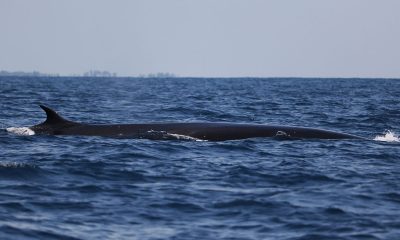
 Features7 days ago
Features7 days agoGiants in our backyard: Why Sri Lanka’s Blue Whales matter to the world


